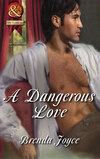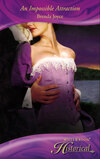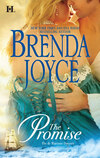Kitabı oku: «The Prize», sayfa 2
The earl spurred his black mount forward. He was tall and dark, his appearance distinct and formidable, his presence emanating power and authority. But his face was a mask of rage. “Where is Mary O’Neill?” he demanded tersely. A navy-blue cloak swirled about his shoulders.
Hughes smiled tightly. “I take it you’ve heard of O’Neill’s untimely demise?”
“Untimely demise?” The Earl of Adare launched himself to the ground and strode forward. “Murder is more like it. You’ve murdered one of my tenants, Hughes.”
“So now you are a papist? He was fated for the gallows, Adare, and you know it.”
Adare stared, trembling with fury, and finally he breathed low. “You bastard. There was always the chance of exile and a royal pardon. I would have moved heaven and earth to make it so. You arrogant son of a bitch.” His hand moved to the hilt of his sword.
Hughes shrugged indifferently. “As I said, a papist and a Jacobin. These are dangerous times, my friend. Even Lord Castlereagh would not want to be associated with a Jacobin.”
For a moment, Adare did not speak, clearly fighting for self-control. “I want the woman. Where is she?”
Hughes hesitated, his jaw flexing, more red color blotching his features.
“Do not make me do something I dearly wish to do—which is choke the very life out of you,” Adare said coldly.
“Fine. An Irish bitch hardly enthralls me. They’re a dozen a penny.”
Devlin was so stunned by the gross insult that he reeled. He would have rushed forward to kill Hughes, but he didn’t have to. Adare strode the brief distance separating him from Hughes and shoved his face up against the captain’s. “Do not underestimate the power of Adare. I suggest you cease with any further slanders before you find yourself in command of redskins in Upper Canada. I dine with Cornwallis on the fifteenth, and there is nothing I would prefer to do than whisper some very unpleasant facts in his ears. Do you understand me, Captain?”
Hughes couldn’t speak. His face had turned crimson.
Adare released him. He strode into the tent, his dark cloak billowing about him.
Devlin exchanged glances with Sean—and then he ran past the red-faced Hughes with his brother in hand and into the tent behind the earl. Instantly he saw his mother sitting in a small chair and he knew at once that she had been weeping.
“Mary!” the earl cried, halting in his tracks. “Are you all right?”
Mary stood, her blue eyes wide, her blond curls in disarray. Their gazes locked. “I thought you would come,” she said unevenly.
Adare hurried forward, gripping her shoulders, his dark blue eyes wide. “Are you hurt?” he asked more softly.
It was a moment before she could speak. “Not in the manner you are thinking, my lord.” She hesitated, staring at him, and her eyes filled with tears. “He murdered Gerald. He murdered my husband before my very eyes.”
“I know,” Adare responded with anguish. “I am sorry. I am so sorry.”
Mary was undone; she looked away, close to weeping again.
He turned her face forward again and their eyes met another time. “Where’s Meg? Where are the boys?”
Tears spilled then. “I don’t know where Meg is. She was in my arms when I fainted and—” She could not continue.
“We’ll find her.” He smiled a little then. “I will find her.”
Mary nodded and it was clear that she believed he might succeed against all hope. And then she saw her sons standing by the tent’s front flap, as still as statues, watching her and the powerful Protestant earl. “Devlin! Sean! Thank God you’re alive—you’re unhurt!” She rushed to them, hugging them both at once.
Devlin closed his eyes, almost incapable of believing that he had found his mother and she was safe, for he knew the earl would take care of her now. “We’re fine, Mother,” he said softly, pulling away from her embrace.
Adare joined them, putting one arm possessively around Mary. His assessing gaze quickly moved over both boys and Devlin met his gaze. A part of him wished to rebel, though they desperately needed the earl’s help now. But Gerald was not yet buried, and he knew Adare’s real inclinations—he had sensed them for some time.
“Devlin, Sean, listen closely,” Adare instructed. “You will ride back to Adare with my men and myself. When we leave this tent, mount up quickly, behind my men. Do you understand me?”
Devlin nodded, but he could not help looking quickly back and forth between Adare and his mother. He had seen the way Adare looked at his mother in the past, but then, many men had admired her from afar. Before Gerald’s death, it had been so easy to tell himself that Adare admired her the way any man would. Now he knew he had lied to himself. He was relieved that the powerful earl was coming to their aid, but he was also resentful. The earl was a widower and he loved Mary. Devlin was certain of it. But what about Father, who was not yet even properly buried? Not yet even cold in his grave?
“Devlin!” Adare’s words were a whip, his gaze as sharp. “Move.”
Devlin quickly obeyed, he and Sean falling into line behind Adare and Mary. And the foursome left the relative safety of the tent.
Outside, the sun was higher, hotter, brighter. An unearthly silence had fallen over the camp and the mountains beyond where more ominous clouds gathered. Dozens of armed British soldiers had formed in banded rows about Adare’s two dozen mounted and armed men. Clearly, if Hughes wished it, there would be another massacre that day.
Devlin glanced at the earl, but if Adare was afraid, he did not show it. Devlin’s respect for him increased. Adare was very much like Gerald, and he must be as brave. He tamped down any fear that was trying to rise.
Adare never faltered as he crossed the ground between the tent and his men. He lifted Mary onto his mount. Hughes was watching, his face rigid with tension and hatred. Devlin pushed Sean at a knight, and as he leapt up behind another rider, Sean was hauled up onto the back of a horse, as well.
Adare was already in the saddle, behind Mary. His gaze swept over the boys, then the rows of armed British soldiers, and finally, Hughes. “You have trespassed upon what is mine,” he said, his words ringing. “Never do so again.”
Hughes smiled grimly. “I had no idea you and the lady were…involved.”
“Do not twist my words, Captain,” Adare cried. “You murdered my liege, you burned my land, and that is an affront to me and mine. Now let us pass.”
Devlin looked from Adare to Hughes as the two men locked gazes. He was aware of sweat gathering between his shoulder blades and trickling down his back. For one moment, the fort was so quiet that had a leaf rustled, it would have been heard.
And finally, Hughes spoke. “Stand aside,” he barked. “Let them go.”
And the line of soldiers parted.
Adare raised his hand, spurring his horse into a canter, leading his men through the British troops and out of the fort.
Devlin held on to the soldier he was riding behind. But he looked back.
Right into the captain’s pale blue eyes.
And the burning began.
It began somewhere deep inside his soul, emanating in huge, hard, dark waves, creeping into his very blood, until it consumed him, bitterly acrid, red hot.
One day he would have his revenge. One day, when the time was right. Captain Harold Hughes would be made to pay the price of Gerald O’Neill’s murder.
Part One
CHAPTER ONE
April 5, 1812
Richmond, Virginia
“SHE DOESN’T EVEN KNOW how to dance,” one of the young ladies snickered.
Her cheeks burning, Virginia Hughes was acutely aware of the dozen young women standing queued behind her in the ballroom. She had been singled out by the dance master and was now being given a lecture on the sissonne ballotté, one of the steps used in the quadrille. Not only did she not comprehend the step, she didn’t care. She had no interest in dancing, none whatsoever—she only wished to go home to Sweet Briar.
“But you must never cease with polite conversation, Miss Hughes, even in the execution of a step. Otherwise you will be severely misconstrued,” the dark, slim master was admonishing.
Virginia really didn’t hear him. She closed her eyes and it was as if she had been swept away to another time and place, one far better than the formidable walls of the Marmott School for Genteel Young Ladies.
Virginia breathed deeply and was consumed with the heady scent of honeysuckle; it was followed by the far stronger and more potent scent of the black Virginia earth, turned up now for the spring burning. She could picture the dark fields, stretching away as far as her eye dared see, parallel lines of slaves made white by their clothes as they spread the coals, and closer, the sweeping lawns, rose gardens and ancient oaks and elms surrounding the handsome brick house that her father had built. “She could have been built in England,” he’d said proudly, many times, “a hundred years ago. No one can take a look at her and know any differently.”
Virginia missed Sweet Briar, but not half as much as she missed her parents. A wave of grief crashed over her, so much so her eyes flew open and she found herself standing back in the damnable ballroom of the school she had been sent to, the dance master looking extremely put out, his hands on his slim hips, a grim expression on his dark Italian face.
“What’s she doing with her eyes screwed up like that?” someone whispered.
“She’s crying, that’s what she’s doing,” came a haughty reply.
Virginia knew it was the blond beauty, Sarah Lewis—who was, according to Sarah, the most coveted debutante in Richmond. Or would be, when she came out at the end of the year. Virginia turned, fury overcoming her, and strode toward Sarah. Virginia was very petite and far too thin, with a small triangular face that held sharp cheekbones and brilliant violet eyes; her dark hair, waist long, was forced painfully up, as she refused to cut it, and appeared in danger of crushing her with its massive weight. Sarah was a good three inches taller than Virginia, not to mention a stone heavier. Virginia didn’t care.
She’d been in her first fight when she was six, a fisticuffs, and when her father had broken up the match, she’d learned she was fighting like a girl. Instruction in how to throw a solid punch—like a boy—had followed, much to her mother’s dismay. Virginia could not only throw a solid punch, she could shoot the top off a bottle at fifty feet with a hunting rifle. She didn’t stop until she was nose to nose with Sarah—which required standing on her tiptoes.
“Dancing is for fools like you,” she cried, “and your name should be Dancing Fool Sarah.”
Sarah gasped, stepping back, her eyes wide—and then the anger came. “Signor Rossini! Did you hear what the country bumpkin said to me?”
Virginia held her head impossibly higher. “This country bumpkin owns an entire plantation—all five thousand acres of it. And if I know my math—which I do—then that makes me one hell of a lot richer than you, Miss Dancing Fool.”
“You’re jealous,”’ Sarah hissed, “because you’re skinny and ugly and no one wants you…which is why you are here!”
Virginia landed hard on her heels. Something cracked open inside of her, and it was painful and sharp. Because Sarah had spoken the truth. No one wanted her, she was alone, and dear God, how awfully it hurt.
Sarah saw that her barb had hit home. She smiled. “Everyone knows. Everyone knows you’ve been sent here until your majority! That’s three years, Miss Hughes. You will be old and wrinkled before you ever go home to your farm!”
“That’s enough,” Signor Rossini said. “Both of you ladies step over to—”
Virginia didn’t wait to hear the rest. She turned and ran from the ballroom, certain there were more titters behind her, hating Sarah, hating the other girls, the dance master, the whole school and even her parents…How could they have left her? How?
In the hallway she collapsed to the floor, hugging her thin knees to her breasts, praying the pain would go away. And she even hated God, because He had taken her parents away from her in one terrible blow, on that awful rainy night last fall. “Oh, Papa,” she whispered against her bony knee. “I miss you so.”
She knew she must not cry. She would die before letting anyone see her cry. But she had never felt so lost and alone before. In fact, she had never been lost and alone before. There had been sunny days spent riding across the plantation with her father and evenings in front of the hearth while Mama embroidered and Papa read. There had been a house full of slaves, each and every one of whom she had known since the very day of her birth. There had been Tillie, her best friend in the entire world, never mind that she was a house slave two years older than Virginia. She hugged her knees harder, inhaling deeply and blinking furiously. It was a long moment before she regained her composure.
And when she did, she sat up straighter. What had Sarah said? That she was to remain at the school until her majority? But that was impossible! She had just turned eighteen and that meant she would be stuck in this awful prison for another three years.
Virginia stood up, not bothering to brush any dust from her black skirts, which she wore in mourning. It had been six months since the tragic carriage accident that had taken her parents’ lives and while the headmistress had expressed an interest in Virginia giving up mourning, she had solidly refused. She intended to mourn her parents forever. She still could not understand why God had let them die.
But surely that witch Sarah Lewis did not know what she was speaking about.
Very disturbed, Virginia hurried down the wood-paneled hall. Her only relative was an uncle, Harold Hughes, the Earl of Eastleigh. After her parents had died, he had sent his condolences and instructions for her to proceed to the Marmott School in Richmond, as he was now her official guardian. Virginia barely recalled any of this; her life then had been reduced to a blur of pain and grief. One day she had found herself in the school, not quite recalling how she had gotten there, only vaguely remembering being in Tillie’s arms one last time, the two girls sobbing goodbyes. Once the initial grief had lessened, she and Tillie had exchanged a series of letters—Sweet Briar was eighty miles south of Richmond and just a few miles from Norfolk. Virginia had learned that the earl was trustee of her estate and that he had ordered everything to continue to be managed as it had been before his brother’s death. Surely, if Sarah was correct, Tillie would have told her of such a terrible and cruel intention on the part of her guardian. Unless she herself did not know of it….
Thinking of Tillie and Sweet Briar always made her homesick. The urge to return home was suddenly overwhelming. She was eighteen, and many young women her age were affianced or even married with their own households. Before their deaths her parents hadn’t raised the subject of marriage, for which Virginia had been grateful. She wasn’t quite sure what was wrong with her, but marriage—and young men—had never occupied her mind. Instead, since the age of five, when Randall Hughes had mounted her on his horse in front of him, she had worked side by side with her father every single day. She knew every inch of Sweet Briar, every tree, every leaf, every flower. (The plantation was a hundred acres, not five thousand, but Sarah Lewis had needed to be taken down a peg or two.) She knew all about tobacco, the crop that was Sweet Briar. She knew the best ways to transplant the seedling crop, the best way to cure the harvested leaves, the best auction houses. Like her father, she had followed the price per bale with avid interest—and fervent hope. Every summer she and her father would dismount and walk through the tobacco fields, fingering the leafy plants in dirty hands, inhaling their succulent aroma, judging the quality of their harvest.
She had had other duties and responsibilities as well. No one was kinder than her mother, and no one knew herbs and healing better. No one cared more about their slaves. Virginia had attended dozens of fevers and flux, right by her mother’s side. She was never afraid to walk into the slave quarters when someone was ill—in fact, she packed a darn good poultice. Although Mama had not allowed her to attend any birthings, Virginia could birth foals, too, and had spent many a night waiting for a pregnant mare to deliver. Why shouldn’t she be at home now, running Sweet Briar with their foreman, James MacGregor? Was there any point in being at this damnable school? She’d been born to run the plantation. Sweet Briar was in her blood, her soul.
Virginia knew she wasn’t a lady. She’d been wearing britches from the moment she had figured out that there were britches, and she liked them better than skirts. Papa hadn’t cared—he’d been proud of her outspoken ways, her natural horsemanship, her keen eye. He had thought her beautiful, too—he’d always called her his little wild rose—but every father thought so of a daughter. Virginia knew that wasn’t true. She was too thin and she had too much hair to ever be considered fair. Not that she cared. She was far too smart to want to be a lady.
Mama had been tolerant of her husband and her daughter. Both of Virginia’s brothers had died at birth, first Todd and then little Charles when she was six. That was when Mama had first looked the other way about the britches, the horses, the hunting. She had cried for weeks, prayed in the family chapel and, somehow, found peace. After that, her smiles and sunny warmth had returned—but there had been no more pregnancies, as if she and Papa had made a silent pact.
Virginia couldn’t comprehend why any woman would even want to be a lady. A lady had to follow rules. Most of the rules were annoying, but some were downright oppressive. Being a lady was like being a slave who didn’t have the fine home of Sweet Briar. Being a lady was no different from being in shackles.
Virginia paused before the headmistress’s office, the decision already made. Whether Sarah Lewis had spoken the truth or not, it no longer mattered. It was time to go home. In fact, making the decision felt good. For the first time since her parents had died, she felt strong—and brave. It was a wonderful way to feel. It was the way she had felt right up until the minister had come to their door to tell her that her parents were dead.
She knocked on the fine mahogany door.
Mrs. Towne, a plump, pleasant lady, gestured her inside. Her kind eyes held Virginia’s, solemn now, when usually they held dancing lights. “I’m afraid you will have to learn to dance sooner or later, Miss Hughes.”
Virginia grimaced. The one person she almost liked at the school was the headmistress. “Why?”
Mrs. Towne was briefly surprised. “Do sit down, my dear.”
Virginia sat, then realized her knees were apart, her hands dangling off the arms of the chair, and quickly rearranged herself, not because she wished to be proper, but because she did not want to antagonize the headmistress now. She clamped her knees together, clasped her hands and thought about how fine it would be to be in her britches and astride her horse.
Mrs. Towne smiled. “It isn’t that difficult to cooperate, dear.”
“Actually, it is.” Virginia was also very stubborn. That trait her mother had bemoaned.
“Virginia, ladies must dance. How else will you attend a proper party and enjoy yourself?”
Virginia didn’t hesitate. “I have no use for parties, ma’am. I have no use for dancing. Frankly, it’s time for me to go home.”
Mrs. Towne stared in mild surprise.
Virginia forgot about sitting properly. “It’s not true, is it? What that wicked Sarah Lewis said? Surely I am not to remain here—forgotten—a prisoner—for another three years?”
Mrs. Towne was grim. “Miss Lewis must have overheard me speaking privately with Mrs. Blakely. My dear, we did receive such instructions from your uncle.”
Virginia was shocked speechless and she could only stare. It was a moment before she could even think.
For a while, she had been afraid that Eastleigh would send for her, forcing her to go to England, where she had no wish to go. That, at least, was one dilemma she did not have to face. But he would lock her up in this school for three more years? She’d already been here six months and she hated it! Virginia would not have it. Oh, no. She was going home.
Mrs. Towne was speaking. “I know that three years seems like a very long time, but actually, considering the way you were raised, it is probably the amount of time we need to fully instruct you in all the social graces you shall need to succeed in society, my dear. And there is good news. Your uncle intends to see you wed upon your majority.”
Virginia was on her feet, beyond shock. “What?”
Mrs. Towne blinked. “I should have known you would be dismayed by the proposal. Every well-born young lady marries, and you are no exception. He intends to find a suitable husband for you—”
“Absolutely not!”
Mrs. Towne was now the one speechless.
Anger consumed Virginia. “First he sends me here? Then he thinks to lock me away for three years? Then he will send me to another prison—a marriage with a stranger? No, I think not!”
“Sit down.”
“No, Mrs. Towne. You see, I will marry one day, but I will marry for love and only love. A grand passion—like my parents had.” Tears blurred her vision. There would be no compromise. One day she would find a man like her father, the kind of love her parents had so obviously shared. There would be—could be—no compromise.
“Virginia, sit down,” Mrs. Towne said firmly.
Virginia shook her head and Mrs. Towne stood. “I know you have suffered a terrible tragedy, and we all feel for you, we do. But you do not control your fate, child, your uncle does. If he wishes you to stay here until your majority, then so it shall be. And I am sure you will come to be fond of your future husband, whoever he may be.”
Virginia couldn’t speak. Panic consumed her. A stranger thought himself to be in control of her life! She felt trapped, as if in a cage with iron bars, worse, the cage was being immersed in the sea and she was drowning!
“My dear, you must make an effort to become a part of the community here. You are the one who has chosen to be disdainful of the other fine young women here. You have not tried, even once, to be friendly or amusing. You have set yourself apart from the moment you arrived and we allowed that, being respectful of your grief. I know why you held your head so high, my dear, but the others, why, they think you prideful and vain! It is time for you to make amends—and friends. I expect you to make friends, Virginia. And I expect you to excel in your studies, as well.”
Virginia hugged herself. Had the others really thought her too proud and vain? She didn’t believe it. They all despised her because she was from the country, because she was so different.
“You are so clever, Virginia. You could do so well here if you bothered to try.” Mrs. Towne smiled at her.
Virginia swallowed hard. “I can’t stay here. And they don’t like me because I am different! I’m not fancy and coy and I don’t faint at the sight of a handsome man!”
“You have chosen to be different, but you are a beautiful girl from a good family, and in truth, that makes you no different at all. You must cease being so independent, Virginia, and you will be very happy here, I promise you.” Mrs. Towne walked over to her and clasped her thin shoulder. “I am sure of this, Virginia. I want nothing more than for you to become a successful graduate of this school—and a very happy young lady.”
Virginia forced a brittle smile. There was nothing more to say. She was not going to stay at the school, and she was not going to let her uncle the earl choose a husband for her—and that was that.
Mrs. Towne smiled at her warmly. “Do give up your rebellious nature, my dear. The rewards will be great if you do.”
Virginia managed to nod. A moment later, the interview was over and she fled. As soon as she was alone on her cot in the dormitory, Virginia began to plan her escape.
TWO DAYS LATER, VIRGINIA performed her morning ablutions as slowly as she could. The other young ladies were filing out of the dormitory while she continued to wash her hands. Early morning light was filtering through the dormitory’s skylights. From the corner of her eye, Virginia watched the last of the young ladies leaving the long, rectangular room. Miss Fern paused at the door. “Miss Hughes? Are you unwell?”
Virginia managed a weak smile. “I’m sorry, Miss Fern, but I am so dizzy and light-headed today.” She hung on to the bureau beside the washstand.
Miss Fern returned to her, touching her forehead lightly. “Well, you do not have a fever. But I suppose you should go to Dr. Mills directly.”
“I think you are right. I must be coming down with influenza. I need a moment, please,” Virginia said, sitting down on the edge of her narrow bed.
“Take a moment, then.” Miss Fern smiled, walked down the aisle between the twenty beds and finally left the room.
Virginia waited, silently counting, “One-two-three,” then she leapt to her feet. She hurried across the aisle to the fourth bed. She went right to the bureau there and began rummaging through contents that did not belong to her. Guilt assailed her, but she ignored it.
Sarah Lewis always had pin money, and Virginia quickly found twelve dollars and thirty-five cents. She took every penny, leaving an unsigned note instead. In it, she explained that she would pay the sum back as soon as possible. Still, it felt terrible being reduced to thievery and she could almost feel her mother’s disapproval as she watched over her daughter from heaven.
“I will pay Sarah back, Mama, every darned penny,” she whispered guiltily. But there was just no choice. She needed fare for a coach and an inn. As brave as she was, she didn’t think she could walk the entire eighty miles to Sweet Briar without several nights’ rest and a few good meals.
Virginia then reached under her bunk. In her cloak—despite the spring weather, the nights remained cool—she had wrapped her few precious personal belongings: her mother’s cameo necklace, her father’s pipe and a horsehair bracelet Tillie had made for her when she was eight. She also had an extra shirtwaist, gloves and bonnet. The entire cloak was bundled up and tied with string. Virginia went to a window at one end of the room, heaved it open and dropped the bundle to the sidewalk below.
Virginia somehow slowed her eager legs and walked demurely downstairs, passing two of the school’s staff as she did so. Finally she reached the end of the hall. Ahead lay the gracious, high-ceilinged foyer of the building. There, marble floors vied with dark wood columns and even darker wood paneling. The front door wasn’t kept locked during the day, as no student ever walked out. Virginia looked carefully around. This was her chance to escape, but if someone saw her now, it was over before her journey had even begun.
Footsteps sounded from a different hall. Virginia darted back around the corner, not daring to breathe, hearing two voices and recognizing them as belonging to the music master and the French professor. She assumed they would cross the foyer and come her way—all of the classrooms lay behind her. Virginia looked around and slipped into the janitor’s closet.
The pair of instructors passed.
Virginia was sweating. She had also lost all patience. She cracked open the door and saw that the hallway was empty. She slipped out, peered into the foyer and found that empty, too. She inhaled hard for courage and rushed across, flinging open the huge and heavy front door. She stepped outside into bright spring sunlight and she smelled and even tasted freedom. God, it was good!
She ran down the walk and out the wrought-iron front gates, down the public sidewalk, around the corner, and found her bundled cloak. Virginia seized it and ran again.
“I’M SO HAPPY WE COULD see you most of your way, my dear,” Mrs. Cantwell said, smiling and clasping Virginia’s hands.
Three days had passed. Virginia had spent most of the first morning on foot until she had left the bustling city of Richmond behind. At a country inn she had eaten a hearty lunch, famished from her long walk. There, she had stumbled across the Cantwell family.
A matronly wife, three proper children, a plump, bespectacled husband—all traveling in a pretty private coach. Virginia had overheard their conversation, learning that they had been to Richmond to visit the husband’s ailing parents. Now they were on their way home to Norfolk. Which meant they would pass within miles of Sweet Briar.
Virginia had helped one of the small children blow his nose and had quickly become the interest of Mrs. Cantwell. She had lied about her age and marital status, claiming that she was returning home to her husband after visiting her ailing mother in Richmond. She had quickly slipped her mother’s ring to her left hand to corroborate her story. Mrs. Cantwell, upon learning of her destination, had quickly offered her a ride, clearly desperate for company and help with the children.
Now Virginia hardly heard the pleasant lady. They were at a crossroads, one sign reading Norfolk, the other reading Land’s End, Four Corners and Sweet Briar. Her heart beat so hard that she felt faint. Five miles down the road was her home. Five simple miles…
“You must miss your husband so much,” Mrs. Cantwell added.
Virginia came to life. She turned and clasped the blond woman’s hands. “Thank you so much for the ride, Lilly. I cannot thank you enough.”














